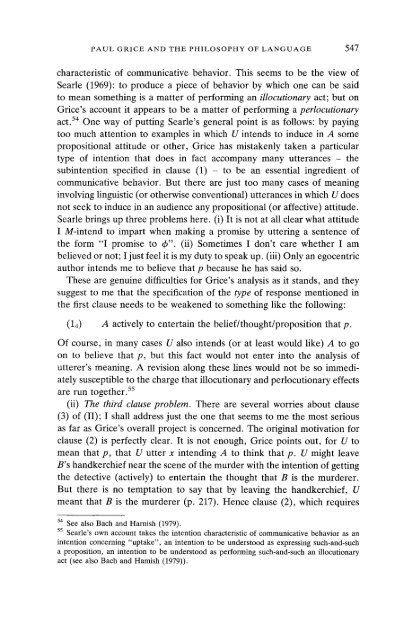Paul Grice and the philosophy of language
Paul Grice and the philosophy of language
Paul Grice and the philosophy of language
Create successful ePaper yourself
Turn your PDF publications into a flip-book with our unique Google optimized e-Paper software.
PAUL GRICE AND THE PHILOSOPHY OF LANGUAGE 547<br />
characteristic <strong>of</strong> communicative behavior. This seems to be <strong>the</strong> view <strong>of</strong><br />
Searle (1969): to produce a piece <strong>of</strong> behavior by which one can be said<br />
to mean something is a matter <strong>of</strong> performing an illocutionary act; but on<br />
<strong>Grice</strong>'s account it appears to be a matter <strong>of</strong> performing a perlocutionary<br />
act. 54 One way <strong>of</strong> putting Searle's general point is as follows: by paying<br />
too much attention to examples in which U intends to induce in A some<br />
propositional attitude or o<strong>the</strong>r, <strong>Grice</strong> has mistakenly taken a particular<br />
type <strong>of</strong> intention that does in fact accompany many utterances - <strong>the</strong><br />
subintention specified in clause (1) - to be an essential ingredient <strong>of</strong><br />
communicative behavior. But <strong>the</strong>re are just too many cases <strong>of</strong> meaning<br />
involving linguistic (or o<strong>the</strong>rwise conventional) utterances in which U does<br />
not seek to induce in an audience any propositional (or affective) attitude.<br />
Searle brings up three problems here. (i) It is not at all clear what attitude<br />
I M-intend to impart when making a promise by uttering a sentence <strong>of</strong><br />
<strong>the</strong> form "I promise to ~b". (ii) Sometimes I don't care whe<strong>the</strong>r I am<br />
believed or not; I just feel it is my duty to speak up. (iii) Only an egocentric<br />
author intends me to believe that p because he has said so.<br />
These are genuine difficulties for <strong>Grice</strong>'s analysis as it st<strong>and</strong>s, <strong>and</strong> <strong>the</strong>y<br />
suggest to me that <strong>the</strong> specification <strong>of</strong> <strong>the</strong> type <strong>of</strong> response mentioned in<br />
<strong>the</strong> first clause needs to be weakened to something like <strong>the</strong> following:<br />
(14) A actively to entertain <strong>the</strong> belief/thought/proposition that p.<br />
Of course, in many cases U also intends (or at least would like) A to go<br />
on to believe that p, but this fact would not enter into <strong>the</strong> analysis <strong>of</strong><br />
utterer's meaning. A revision along <strong>the</strong>se lines would not be so immediately<br />
susceptible to <strong>the</strong> charge that illocutionary <strong>and</strong> perlocutionary effects<br />
are run toge<strong>the</strong>rY<br />
(ii) The third clause problem. There are several worries about clause<br />
(3) <strong>of</strong> (II); I shall address just <strong>the</strong> one that seems to me <strong>the</strong> most serious<br />
as far as <strong>Grice</strong>'s overall project is concerned. The original motivation for<br />
clause (2) is perfectly clear. It is not enough, <strong>Grice</strong> points out, for U to<br />
mean that p, that U utter x intending A to think that p. U might leave<br />
B's h<strong>and</strong>kerchief near <strong>the</strong> scene <strong>of</strong> <strong>the</strong> murder with <strong>the</strong> intention <strong>of</strong> getting<br />
<strong>the</strong> detective (actively) to entertain <strong>the</strong> thought that B is <strong>the</strong> murderer.<br />
But <strong>the</strong>re is no temptation to say that by leaving <strong>the</strong> h<strong>and</strong>kerchief, U<br />
meant that B is <strong>the</strong> murderer (p. 217). Hence clause (2), which requires<br />
s4 See also Bach <strong>and</strong> Harnish (1979).<br />
55 Searle's own account takes <strong>the</strong> intention characteristic <strong>of</strong> communicative behavior as an<br />
intention concerning "uptake", an intention to be understood as expressing such-<strong>and</strong>-such<br />
a proposition, an intention to be understood as performing such-<strong>and</strong>-such an illocutionary<br />
act (see also Bach <strong>and</strong> Hamish (1979)).














